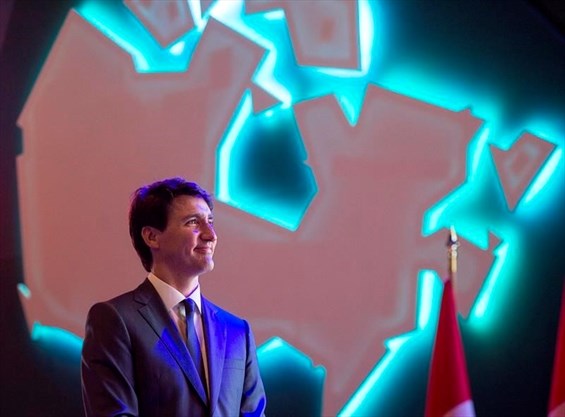Damned if he did, damned if he didn’t. That’s the general consensus around Prime Minister Justin Trudeau’s decision to buy out the Trans Mountain pipeline. Kinder Morgan had set a deadline of May 31, after which it threatened to pull the plug unless the federal government could guarantee the project would go ahead.

Kyboshing it would have cost 15,000 construction jobs, $3.7 billion in additional annual oil revenues, and $47 billion in provincial and federal taxes over 20 years. It would have also cost Canada’s reputation as a place where megaprojects can get built, where a government agency’s approval actually matters, and where a prime minister’s promises can be kept.

WATCH: Trans Mountain purchase prompts political fireworks in Ottawa
His back against the wall, Trudeau did what many politicians in a similar circumstance would have done: threw public money at the problem to make it go away. This isn’t just a Liberal response; faced with the potential collapse of the auto industry in 2009, Conservative Prime Minister Stephen Harper bailed out Chrysler and GM, ultimately costing taxpayers $3.5 billion. The Quebec Liberal government bought into Bombardier in 2016 to the tune of $1 billion, only to see shares drop and the company lose contracts.
Add these to the list of countless companies and Crown Corporations — such as Pratt and Whitney and VIA Rail — who have received some $648 billion in subsidies over the past 30 years, and it’s clear that this relationship between the state and business has always been pretty cozy.
Heck, the grand-daddy of all Canadian mega-projects, the Canadian Pacific Railway, was backed by public money, government credit and land grants back in the late 1800s.
But we are in 2018, not 1881. Social licence didn’t matter back then: First Nations weren’t launching court challenges, and environmentalists weren’t chaining themselves to trees. There was no Charter of Rights, as evidenced by the abysmal treatment of the 15,000 Chinese workers imported to finish the railroad’s construction. Governments just got things done, and the “national interest” often dovetailed with personal interest, as financiers and politicians worked together with a lot less scrutiny, even if some, like John A. MacDonald, did overstep their bounds now and then.

WATCH: Natural Resources Minister Jim Carr speaks about what the next steps are for the Trans Mountain pipeline project

Get daily National news
The biggest interest here could be that of Trudeau, who stands to lose major face if he cannot keep his election pledge, oft repeated since, that the pipeline will be built. If that was his intention, however, he should have acted well before the eleventh hour, namely, the minute Christy Clark’s government fell in June 2017. Clark had supported the pipeline, but her successor, NDP leader John Horgan, did not and when he emerged with a minority government propped up by a couple of Green party MPPs, Trudeau should have realized that all bets for the pipeline were off, and that action was required.
What could Trudeau have done? It was clear that the only remedies B.C. could seek were in the courts. Instead of waiting for the province to file its case, Trudeau should have beat them to the punch, fast-tracked a reference to the Supreme Court, and had them rule on whether B.C. had any authority to block the project. Yes, there would have been risk involved — but since this was the route B.C. was taking anyway, it was simply a question of time, not tactics.
Trudeau’s failure to act makes one wonder whether he contemplated the buy-out scenario all along. Problem is, buying out the pipeline does not create any more certainty about the project coming to completion; it simply shifts the risk from a private company to the taxpayer.
The issue here was never about money, but political will. Ottawa was unable to guarantee that the pipeline would go ahead, that it wouldn’t be stymied by changes of government, court challenges, or protests. As Horgan said Wednesday, “it does not matter who owns the pipeline,” the province will continue to fight it.

WATCH: ‘Our reference case remains,’ John Horgan says on controlling pipeline oil flow in B.C.
And should the courts rule in the favour of B.C., construction could still come to a grinding halt. This may be less likely now, as the federal government will be able to plead a “national interest” case more effectively than a private corporation could.
But B.C. still has a case that it has a constitutional right to protect its environment, a jurisdiction it shares with the federal government. The Supreme Court of Canada’s recent Comeau decision, which affirms provinces’ rights to act within their borders, even if this has the incidental effect of limiting interprovincial commerce, still stands.
- Quebec premier calls on Bloc Québécois to help topple Trudeau government
- Americans can now renew passports online. Canadians are still waiting
- Pablo Rodriguez quits Trudeau cabinet to seek Quebec Liberal leadership
- Telus call centre workers in Ontario facing ‘extreme stress’ as they fight Quebec move
The government will now also be subject to obligations under the Charter of Rights that would not have applied to a private company like Kinder Morgan. Environmentalists, First Nations, anti-capitalists: one can see a thousand Charter challenges blooming. One Charter right is the right to protest. Would Ottawa invoke the notwithstanding clause to override it? Would it bodily remove the protestors from construction sites? Does anyone believe Trudeau has the stomach for a Western Oka Crisis?
Indeed, it’s hard to see much political upside for Trudeau in this week’s decision. Yes, he looks decisive — but he also just blew a $4.5-billion hole in the government’s bottom line. He will likely lose seats in B.C., while not gaining any in Alberta. He has enraged two of his key constituencies on the left, being the green movement and First Nations, who may now turn to the federal NDP. And in Quebec, which saw staunch opposition to the Energy East pipeline, voters may now wonder whether the federal government might resurrect that project as well. Meanwhile, the bills will mount, along with the opposition.
Damned if he did, damned if he didn’t. Trudeau hasn’t built a pipeline, he just passed the buck.
Tasha Kheiriddin can be heard between noon and 2 p.m. ET on Global News Radio 640 Toronto. She’s also a columnist with Global News and iPolitics.ca, where this piece first appeared.








Comments